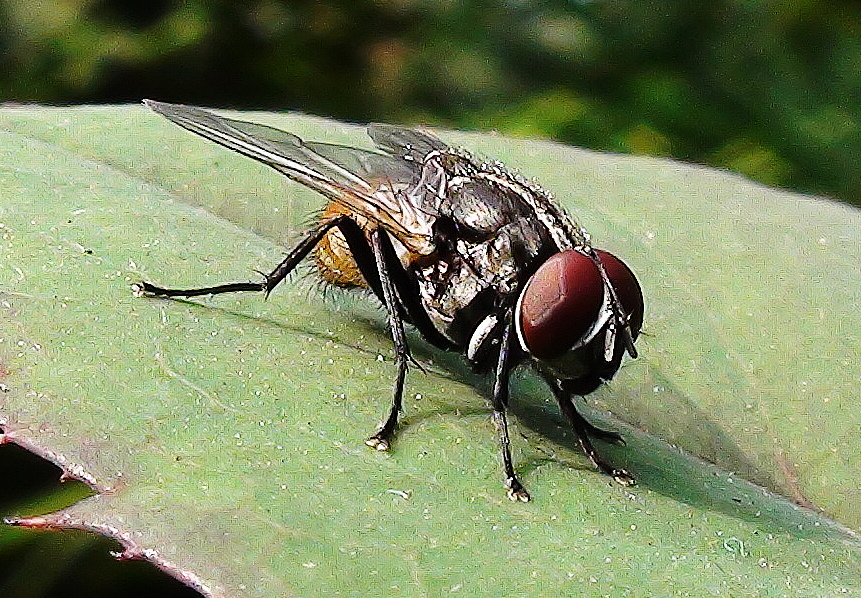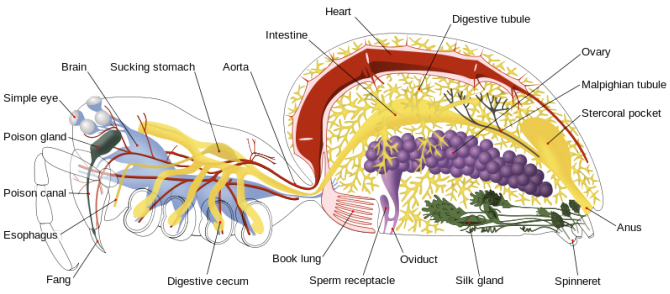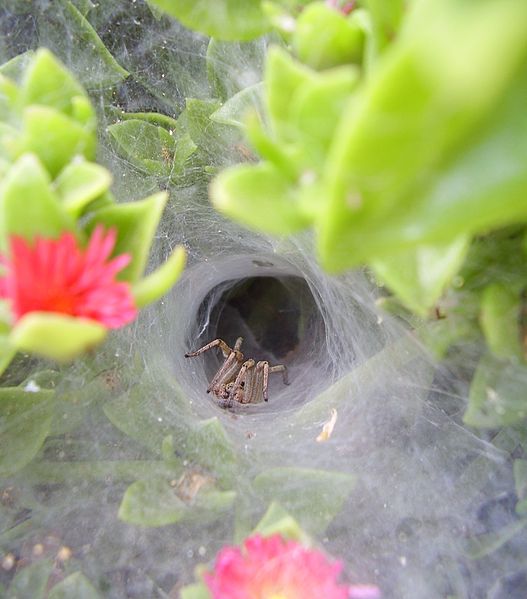Nutrition
The hobo spider is found at about the middle of the food
chain. It feeds on mainly primary consumers, but there are
many things that eat the hobo spider as well. It is
heterotrophic, meaning it has to consume ot her organisms to get
its food. It is specifically a carnivore because it
doesn’t feed on plant material. The hobo spider is
successful at capturing food because it uses its web
effectively. It is a member of the family Agelenidae,
which is composed of the funnel web weavers. The web that
these spiders spin is flat, layered, and has a funnel-shaped
spot in the back. The spider sits in this spot and waits
for its prey to come. Unlike some webs, the webs of funnel
web weavers are not sticky. The web trips up the insect
when it flies by and then the spider attacks it with its fangs that are on the
chelicerae. The venom in the fangs kills the prey and then
the spider releases digestive enzymes to digest it. The
spider then consumes it using its chelicerae. It may wrap
the prey in silk if it doesn’t feel like eating at the moment to
preserve it for a later time. The diet of Tegenaria
agrestis is composed mainly of small insects.
her organisms to get
its food. It is specifically a carnivore because it
doesn’t feed on plant material. The hobo spider is
successful at capturing food because it uses its web
effectively. It is a member of the family Agelenidae,
which is composed of the funnel web weavers. The web that
these spiders spin is flat, layered, and has a funnel-shaped
spot in the back. The spider sits in this spot and waits
for its prey to come. Unlike some webs, the webs of funnel
web weavers are not sticky. The web trips up the insect
when it flies by and then the spider attacks it with its fangs that are on the
chelicerae. The venom in the fangs kills the prey and then
the spider releases digestive enzymes to digest it. The
spider then consumes it using its chelicerae. It may wrap
the prey in silk if it doesn’t feel like eating at the moment to
preserve it for a later time. The diet of Tegenaria
agrestis is composed mainly of small insects.

Once the hobo spider does consume its prey, it needs to distribute
the nutrients out to the entire body. Tegenaria agrestis does
this effectively via a circulatory system, specifically an open
circulatory system. In an open circulatory system, the
transfer fluid in the organism isn’t enclosed by veins or
arteries. The transport fluid is pumped from the heart and
travels to other parts of the body via blood vessels, but once it
gets to a certain spot it is released from the vessels. The
transport fluid then “bathes” that particular part of the body and
gives it nutrients. In humans the transport fluid is blood,
but in spiders it is hemolymph. Hemolymph is blood
mixed with other kinds of fluids.
The hobo spider also needs to oxygenate the hemolymph.
Humans have lungs to do this, but this is not the case for spiders.
They have a system in place called book lungs. They are
folded respiratory surfaces that almost look like the
pages of a book. The respiratory surfaces are an alternating
stack of fluid compartments and air sacs. These structures
allow the hobo spider to breath and perform respiration. They
are found in the abdominal cavity of the spider.
Life of the Hobo
Home
